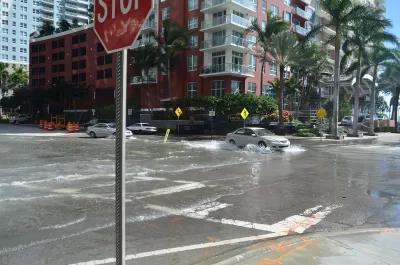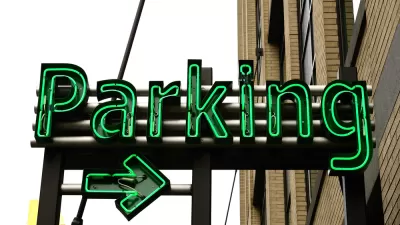It's unclear when the law will take effect, but the Miami City Commission has approved that an ordinance that heads in the opposite direction of current planning trends and even the city's own groundbreaking zoning code.

"Miami commissioners voted 4-1 last week in favor of an ordinance that would essentially force developers to build more parking," according to an article by the Next Miami.
Commissioner Manolo Reyes is quoted in the article saying Miami is "not a pedestrian and bicycle city" and "we don’t have a mass transit system, period."
"Commissioner Joe Carollo also spoke in favor of the ordinance at the meeting," according to the article. "He has previously called developers 'greedy' for wanting to build less parking."
As for the changes proposed by the ordinance: "Developers will be required to build the full amount of parking required by zoning, unless they can get a commission vote to allow a reduction for their specific project. Parking reduction waivers by city planners for projects near transit stops will no longer be permitted."
According to the article, the commissioners overrode the objections of a Miami zoning task force and the city's Planning and Zoning Board in voting for the approval for the ordinance.
According to the Parking Reform Network, Miami waived minimum parking requirements for newly constructed buildings in the city's downtown when it adopted the Miami 21 form-based code in 2009.
Previous coverage, published in February 2022 by the Next Miami, provides more background. Neither article explains whether the ordinance has been fully adopted and when the law would take effect if so. Please let us know in the comments if you have more information.
FULL STORY: Miami ‘Is Not A Pedestrian & Bicycle City,’ Commissioner Says, Before Voting To Require More Parking

Maui's Vacation Rental Debate Turns Ugly
Verbal attacks, misinformation campaigns and fistfights plague a high-stakes debate to convert thousands of vacation rentals into long-term housing.

Planetizen Federal Action Tracker
A weekly monitor of how Trump’s orders and actions are impacting planners and planning in America.

San Francisco Suspends Traffic Calming Amidst Record Deaths
Citing “a challenging fiscal landscape,” the city will cease the program on the heels of 42 traffic deaths, including 24 pedestrians.

In U.S., Urban Gondolas Face Uphill Battle
Cities in Latin America and Europe have embraced aerial transitways — AKA gondolas — as sustainable, convenient urban transport, especially in tricky geographies. American cities have yet to catch up.

Detroit Says Problems With Property Tax Assessments are Fixed. Advocates Disagree.
With higher-valued properties under assessed and lower-valued properties over assessed, advocates say there's still a problem with Detroit's property tax system.

Defunct Pittsburgh Power Plant to Become Residential Tower
A decommissioned steam heat plant will be redeveloped into almost 100 affordable housing units.
Urban Design for Planners 1: Software Tools
This six-course series explores essential urban design concepts using open source software and equips planners with the tools they need to participate fully in the urban design process.
Planning for Universal Design
Learn the tools for implementing Universal Design in planning regulations.
Heyer Gruel & Associates PA
JM Goldson LLC
Custer County Colorado
City of Camden Redevelopment Agency
City of Astoria
Transportation Research & Education Center (TREC) at Portland State University
Jefferson Parish Government
Camden Redevelopment Agency
City of Claremont





























